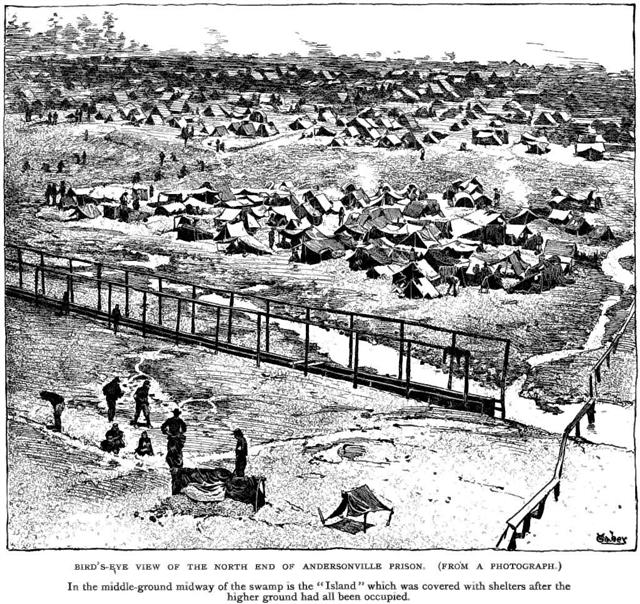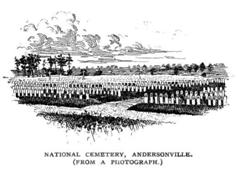
There was a sutler located within the stockade, whose establishment contained a little flour, soda, salt, cream of tartar, pepper, sweet potatoes, onions, etc. The whole contents of the store could have been swallowed, at any one time, by ten of our hungry men in an hour. He charged one dollar per pint for salt, one dollar per quart for flour, ten cents each for very small onions, forty cents per pound for sweet potatoes, four to ten dollars per pound for tobacco, and everything else in proportion. A lemon did occasionally find its way within our prison, but I never saw one sold. I saw a few very small Irish potatoes that sold for five cents each, and were advertised to be excellent for scurvy.
Some time in July "cow peas" made their appearance, a vegetable that seemed to be a cross between a pea and a bean, and about the 1st of August they commenced to issue rations of these beans to some of the prisoners. The beans took the place of the corn-bread and bacon, and were issued to some raw and to others cooked; about half a pint of the raw being a day's ration, and two-thirds of a pint of the cooked.
About this time commenced the great mania for trade. One had two spoonfuls of pease which he would trade for half a ration of corn-bread; another offered half his ration of raw pease for a small morsel of bacon to cook with his remaining half. For a short time after pease began to come in as rations those who received them could readily exchange them for a double ration of bread. Trade grew rapidly among us, and soon one-half our number were trying to better their own condition by trading with one another and selling to the other half.
The Western troops, captured from Sherman's and Thomas's commands, were not robbed of their money and valuables, as were the Eastern troops, so there was considerable money floating within the prison among the privileged few; but it was constantly changing ownership, and finally it all got into the hands of the very few, except the greater part that found its way outside by passing through the sutler's shop.
A few, by sharp trading, commencing with a dollar or two, were soon worth their hundreds. Little stands were erected in all parts of the prison, those who could not erect a stand using their knees, upon which they would display perhaps half a dozen sweet potatoes, a pint of salt, two or three pounds of flour, a quart of pease, etc., all well covered with dust and flies.
The only living things that seemed to thrive at this place were the flies, and they swarmed. Everything was covered with them, and they were responsible for the maggots that kept the swamp a moving mass of corruption.

"Main street," as it was called, the drive-way for the teams that brought in the rations, soon became the center of trade — our "exchange." Hundreds crowded it from early morning till late evening with their rations of bread, pease, or bacon to exchange or sell for something they had not got; and although tobacco was more plentiful than any other article in the Confederacy, it would take two days rations of food to buy enough tobacco to satisfy an ordinary chewer or smoker for a day. I have seen one of these tradesmen sit within the “exchange" and cry out the good qualities and cheapness of less than half a pint of stewed pease for three long hours, and finally exchange the whole stock for three quids of tobacco; though not exactly satisfied with his bargain, all his murmuring would cease upon getting a taste of the precious weed.
“Here 's your fresh-stewed pease, well seasoned with salt and pepper, only fifteen cents a plate!" "Here's your nice boiled bacon, only ten cents a piece!" "Here's your pure, clean salt, only five cents a spoonful!" "Who’ll trade a ration of pease for a ration of bread and bacon?" These were the constant cries from hundreds of lips along our "exchange" during the whole day. At the same time there was not food enough in the whole prison pen to give one-third of our number one meal in quantity, to say nothing of quality.
Several enterprising individuals commenced to manufacture beer. They procured a keg or barrel from the sutler, in which would be placed four or five quarts of com-meal and as many gallons of water. After remaining in the hot sun for a day or two the mixture would become very sour; then the keg would be filled with water and the whole allowed to work itself clear, when it would be drawn as beer and sold for five cents per glass, or half-pint. At first it sold well, and tasted good; in fact, it was the only sour thing we could get; and it really seemed to check the ravages of scurvy for a time.
A comrade, Dick Williams, and myself tried our hands at speculating. We purchased a twenty eight pound box of tobacco of the sutler, paying him only half the price it was retailing for. First helping ourselves, we exposed it for sale, waiting two whole days for the first customer; but we finally succeeded in disposing of about half the box while we were using the other half, yet we hardly got back our capital.

visits since 02/21/2004.
Page updated
05/25/2006